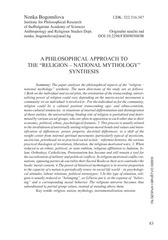Приказ основних података о документу
A Philosophical Approach to the “Religion – National Mythology” Synthesis
Filozofski pristup sintezi „religija – nacionalna mitologija“
| dc.creator | Bogomilova, Nonka | |
| dc.date.accessioned | 2017-11-01T10:14:51Z | |
| dc.date.available | 2017-11-01T10:14:51Z | |
| dc.date.issued | 2009 | |
| dc.identifier | 0353-5738 | |
| dc.identifier.uri | http://rifdt.instifdt.bg.ac.rs/123456789/7 | |
| dc.description.abstract | The paper analyses the philosophical aspects of the “religion – national mythology” synthesis. The main directions of the study are as follows: 1.Both on the individual and social plan, the orientation of the transcending, universalizing power of religion could vary depending on the macro-social movements a community /or an individual/ is involved in . For the individual as for the community, religion could be a cultural position transcending ego- and ethno-centrism, mono-cultural tendencies; in situations of internal differentiation and disintegration of these entities, the universalizing, binding role of religion is partialized and determined by various social groups, who are often in opposition to each other due to their economic, political, ethnic, psychological features; 2. This process is usually related to the invalidation of universally uniting religious-moral bonds and values and intensification of differences: power, property, doctrinal differences; to a shift of the weight center from internal spiritual movements /particularly typical of mysticism, asceticism, priesthood/ on to practical social action – reformist heresies, the various practical theologies of revolution, liberation, the religious-motivated wars; 3. When reduced to an ethnic, political, or state emblem, religious affiliation to Judaism, Islam, Orthodoxy, Catholicism, Protestantism has become and still remain a tool for the sacralization of military and political conflicts. In religion-motivated conflict situations, opposing parties de-sacralize their Sacred Books as their acts contradict the books’moral content; 4.The power of historical mythologies is in reverse proportion to the capacity of a nation to periodically renew its social life world – its psychological attitudes, labour relations, political stereotypes; 5.In this type of situation, religion is usually reduced to “belonging”, as G.Davie put it, at the expense of “believing” and a corresponding moral behavior. The religious universe becomes thus subordinated to partial group values, instead of standing above them. | eng |
| dc.format | 3 20 (2009) 83-96 | |
| dc.format | application/pdf | |
| dc.language | en | |
| dc.publisher | Beograd: Institut za filozofiju i društvenu teoriju | |
| dc.rights | openAccess | |
| dc.rights.uri | https://creativecommons.org/licenses/by-nc-nd/4.0/ | |
| dc.source | Filozofija i društvo / Philosophy and Society | mul |
| dc.subject | religion | |
| dc.subject | nation | |
| dc.subject | mythology | |
| dc.subject | instrumentalizacija | |
| dc.subject | misija | |
| dc.title | A Philosophical Approach to the “Religion – National Mythology” Synthesis | eng |
| dc.title | Filozofski pristup sintezi „religija – nacionalna mitologija“ | sr |
| dc.type | article | |
| dc.rights.license | BY-NC-ND | |
| dcterms.abstract | Богомилова, Нонка; Филозофски приступ синтези „религија – национална митологија“; | |
| dc.citation.spage | 83 | |
| dc.citation.epage | 96 | |
| dc.identifier.doi | 10.2298/FID0903083B | |
| dc.type.version | publishedVersion | |
| dc.identifier.fulltext | http://rifdt.instifdt.bg.ac.rs/bitstream/id/5025/5.pdf |

